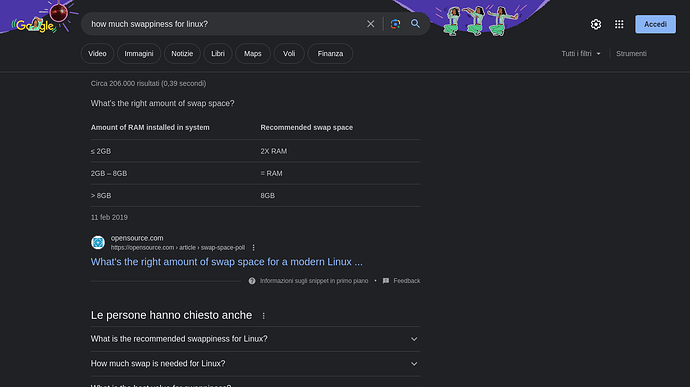I recently tested again opening the lid both with and without audio software opened and even with much other software opened to prove a power-saving rule enabled that closes audio service but forgetting to restart it at next relogin and effectively this is a nice possibility. In fact, a small detail I didn't tell is that sometimes when opening the lid I can see an energy notification and some command-like sentences but they last less than half a second so I don't remember what they say, I'll check again, maybe recording a video. Meanwhile, after the problem happened again I entered pulseaudio -k as you suggested and it worked so at least I have a way to restart the audio until I fix this definitively, thanks ![]() .
.
It would have been nice to also know that you get that warning ( power saving) Please disable your power saver, & anything else that needs power on wake-up.
As it's a low end spec machine it is struggling to supply power to everything needing power.
So your machine will compensate by not allowing power to parts that are not totally needed to start back up.
Again How much Swap do you have?
your machine will recover from shutdown or hibernation ( this uses you Hdd to reset/restart thing's on standby.) Better than sleep or suspend.
These are my Power Saving settings:
Black screen > 5 minutes
Automatic suspension > enabled
Wi-Fi shutdown > disabled
These are my Screen Lock settings:
Black screen delay > 5 minutes
Automatic Screen Lock > enabled
Automatic Screen Lock delay > Screen shutdown
Screen Lock or Suspension > enabled
Show notifications on locked screen > enabled
2,0 GiB
Please try Zorin Lite, also 32bit may run better.
What happened to my computer these days...
Did you manage to fix it?
I tested a bit more and noticed that when audio works I see this ![]()
while I noticed that when it doesn't (after relogging in) I see this (Dummy Output)
You know, I don't feel much the need to try that, too. I don't want to install new systems for now.
Yeah, I remember ![]() .
.
No, not yet, but when I feel inspired ![]() I'll apply the whole commands Ocka suggested, I'm not done yet with this problem. I hope applying those commands I won't make serious damage or even make my laptop unusable, I risked a lot some months ago with an inconsistent filesystem.
I'll apply the whole commands Ocka suggested, I'm not done yet with this problem. I hope applying those commands I won't make serious damage or even make my laptop unusable, I risked a lot some months ago with an inconsistent filesystem.
There are several tips here including some scripts.
I read that the differences between my case and Victor's one is that he hears sound on headphones but not from his laptop speakers and then, by suggestions, he ran
# echo 1 > /sys/bus/pci/devices/(device address)/remove
# echo 1 > /sys/bus/pci/rescan
but in my case a simple pulseaudio -k as Ocka suggested is fine as workaround. Then in another moment I'll apply commands he proposed.
luca@Asus:~$ lspci
00:00.0 Host bridge: Advanced Micro Devices, Inc. [AMD] RS880 Host Bridge
00:01.0 PCI bridge: ASUSTeK Computer Inc. AMD RS780/RS880 PCI to PCI bridge (int gfx)
00:04.0 PCI bridge: Advanced Micro Devices, Inc. [AMD] RS780/RS880 PCI to PCI bridge (PCIE port 0)
00:05.0 PCI bridge: Advanced Micro Devices, Inc. [AMD] RS780/RS880 PCI to PCI bridge (PCIE port 1)
00:11.0 SATA controller: Advanced Micro Devices, Inc. [AMD/ATI] SB7x0/SB8x0/SB9x0 SATA Controller [AHCI mode]
00:12.0 USB controller: Advanced Micro Devices, Inc. [AMD/ATI] SB7x0/SB8x0/SB9x0 USB OHCI0 Controller
00:12.2 USB controller: Advanced Micro Devices, Inc. [AMD/ATI] SB7x0/SB8x0/SB9x0 USB EHCI Controller
00:13.0 USB controller: Advanced Micro Devices, Inc. [AMD/ATI] SB7x0/SB8x0/SB9x0 USB OHCI0 Controller
00:13.2 USB controller: Advanced Micro Devices, Inc. [AMD/ATI] SB7x0/SB8x0/SB9x0 USB EHCI Controller
00:14.0 SMBus: Advanced Micro Devices, Inc. [AMD/ATI] SBx00 SMBus Controller (rev 42)
00:14.2 Audio device: Advanced Micro Devices, Inc. [AMD/ATI] SBx00 Azalia (Intel HDA) (rev 40)
00:14.3 ISA bridge: Advanced Micro Devices, Inc. [AMD/ATI] SB7x0/SB8x0/SB9x0 LPC host controller (rev 40)
00:14.4 PCI bridge: Advanced Micro Devices, Inc. [AMD/ATI] SBx00 PCI to PCI Bridge (rev 40)
00:16.0 USB controller: Advanced Micro Devices, Inc. [AMD/ATI] SB7x0/SB8x0/SB9x0 USB OHCI0 Controller
00:16.2 USB controller: Advanced Micro Devices, Inc. [AMD/ATI] SB7x0/SB8x0/SB9x0 USB EHCI Controller
00:18.0 Host bridge: Advanced Micro Devices, Inc. [AMD] Family 10h Processor HyperTransport Configuration
00:18.1 Host bridge: Advanced Micro Devices, Inc. [AMD] Family 10h Processor Address Map
00:18.2 Host bridge: Advanced Micro Devices, Inc. [AMD] Family 10h Processor DRAM Controller
00:18.3 Host bridge: Advanced Micro Devices, Inc. [AMD] Family 10h Processor Miscellaneous Control
00:18.4 Host bridge: Advanced Micro Devices, Inc. [AMD] Family 10h Processor Link Control
01:05.0 VGA compatible controller: Advanced Micro Devices, Inc. [AMD/ATI] RS880M [Mobility Radeon HD 4225/4250]
01:05.1 Audio device: Advanced Micro Devices, Inc. [AMD/ATI] RS880 HDMI Audio [Radeon HD 4200 Series]
02:00.0 Network controller: Qualcomm Atheros AR9285 Wireless Network Adapter (PCI-Express) (rev 01)
03:00.0 System peripheral: JMicron Technology Corp. SD/MMC Host Controller (rev 80)
03:00.2 SD Host controller: JMicron Technology Corp. Standard SD Host Controller (rev 80)
03:00.3 System peripheral: JMicron Technology Corp. MS Host Controller (rev 80)
03:00.4 System peripheral: JMicron Technology Corp. xD Host Controller (rev 80)
03:00.5 Ethernet controller: JMicron Technology Corp. JMC250 PCI Express Gigabit Ethernet Controller (rev 03)
luca@Asus:~$ ls /sys/bus/pci/devices/ | grep 01:05.1
0000:01:05.1
luca@Asus:~$ echo 1 > /sys/bus/pci/devices/0000:01:05.1/remove
bash: /sys/bus/pci/devices/0000:01:05.1/remove: Permission denied
![]() .
.
Well, I was just following Ocka commands, then with echo 1 > /sys/bus/pci/rescan I'd have added it back. For common sense and simple logic, the first command removes the audio source while the second adds it back. Do you know other methods?
I read a bit about swap partition, I'm not completely sure how to determine the amount to set, I read this ![]()
then I read that table ![]()
and I also read some common questions there under People also ask so I wasn't sure if the value is fine
The default on Zorin OS is swappiness = 60. The size is usually set to 2gig.
I would say that the default qualifies as the recommended.
As far as what negative effects you might see setting it to 5... I would think there would be little in the way of that.
All that does is allow more space to be devoted to Random Access Memory (Virtual) by a small amount. You have not added to the point of "doubling" your RAM, so you won't notice any effect at all.
What can be noticed is when you change your swappiness.
So when I change swap size I have to change swappiness accordingly?
No, you do not. Swappiness deals with how swiftly the system will rely on swap. The Size sets how much swap you will use. They are two different parameters.
You can set either by your preferences without regard of how those numbers relate to the other.
BTW, is your drive an SSD?
I'm not sure, can't find its type ![]() .
.
Spinning Hard Drive.
Perfectly safe for use with Swap.
I must also consider that I never saw swap memory being used when I checked System Monitor. To be fair, since I have 6 GB of RAM of which 0.5 GB is hidden for safety as system use only memory (so not exploitable by the user), probably actually 2 GB of swap memory is enough for me. At most when I open multiple software at once it's usually Firefox (the preinstalled), Discord (the .deb) and Minetest (the flat), plus occasionally Rhythmbox, Files and a text document. In both situations I've never seen swap memory usage, I may have underestimated my laptop. Probably to see swap memory usage I should run the software I mentioned earlier double, 2 instances each, then maybe I could see something about swap memory usage.
I opened much stuff, then stopped when I saw a certain lag. I'd probably have to open these programs twice to see a consistent swap usage but I think I went off-topic enough.
What about changing audio provider? Should I try another one to see if the problem happens again or replacing PulseAudio is too dangerous? I mean temporarily of course, to test another provider, definitively only if the audio works every time I log in again.









